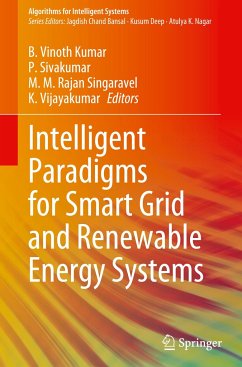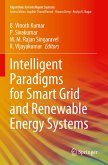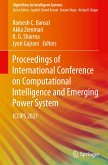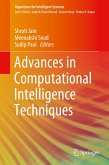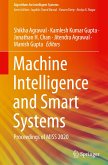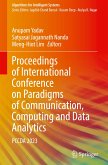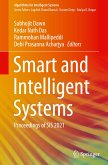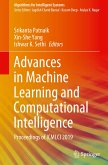Intelligent Paradigms for Smart Grid and Renewable Energy Systems
Herausgegeben:Vinoth Kumar, B.; Sivakumar, P.; Rajan Singaravel, M.M.; Vijayakumar, K.
Intelligent Paradigms for Smart Grid and Renewable Energy Systems
Herausgegeben:Vinoth Kumar, B.; Sivakumar, P.; Rajan Singaravel, M.M.; Vijayakumar, K.
- Gebundenes Buch
- Merkliste
- Auf die Merkliste
- Bewerten Bewerten
- Teilen
- Produkt teilen
- Produkterinnerung
- Produkterinnerung
This book addresses and disseminates state-of-the-art research and development in the applications of intelligent techniques for smart grids and renewable energy systems. This helps the readers to grasp the extensive point of view and the essence of the recent advances in this field. The book solicits contributions from active researchers which include theory, case studies and intelligent paradigms pertaining to the smart grid and renewable energy systems. The prospective audience would be researchers, professionals, practitioners and students from academia and industry who work in this field.
Andere Kunden interessierten sich auch für
![Intelligent Paradigms for Smart Grid and Renewable Energy Systems Intelligent Paradigms for Smart Grid and Renewable Energy Systems]() Intelligent Paradigms for Smart Grid and Renewable Energy Systems145,99 €
Intelligent Paradigms for Smart Grid and Renewable Energy Systems145,99 €![Proceedings of International Conference on Computational Intelligence and Emerging Power System Proceedings of International Conference on Computational Intelligence and Emerging Power System]() Proceedings of International Conference on Computational Intelligence and Emerging Power System185,99 €
Proceedings of International Conference on Computational Intelligence and Emerging Power System185,99 €![Advances in Computational Intelligence Techniques Advances in Computational Intelligence Techniques]() Advances in Computational Intelligence Techniques137,99 €
Advances in Computational Intelligence Techniques137,99 €![Machine Intelligence and Smart Systems Machine Intelligence and Smart Systems]() Machine Intelligence and Smart Systems161,99 €
Machine Intelligence and Smart Systems161,99 €![Proceedings of International Conference on Paradigms of Communication, Computing and Data Analytics Proceedings of International Conference on Paradigms of Communication, Computing and Data Analytics]() Proceedings of International Conference on Paradigms of Communication, Computing and Data Analytics225,99 €
Proceedings of International Conference on Paradigms of Communication, Computing and Data Analytics225,99 €![Smart and Intelligent Systems Smart and Intelligent Systems]() Smart and Intelligent Systems225,99 €
Smart and Intelligent Systems225,99 €![Advances in Machine Learning and Computational Intelligence Advances in Machine Learning and Computational Intelligence]() Advances in Machine Learning and Computational Intelligence162,99 €
Advances in Machine Learning and Computational Intelligence162,99 €-
-
-
This book addresses and disseminates state-of-the-art research and development in the applications of intelligent techniques for smart grids and renewable energy systems. This helps the readers to grasp the extensive point of view and the essence of the recent advances in this field. The book solicits contributions from active researchers which include theory, case studies and intelligent paradigms pertaining to the smart grid and renewable energy systems. The prospective audience would be researchers, professionals, practitioners and students from academia and industry who work in this field.
Produktdetails
- Produktdetails
- Algorithms for Intelligent Systems
- Verlag: Springer / Springer Nature Singapore / Springer, Berlin
- Artikelnr. des Verlages: 978-981-15-9967-5
- 1st edition 2021
- Seitenzahl: 404
- Erscheinungstermin: 16. Dezember 2020
- Englisch
- Abmessung: 241mm x 160mm x 28mm
- Gewicht: 770g
- ISBN-13: 9789811599675
- ISBN-10: 981159967X
- Artikelnr.: 60337151
- Herstellerkennzeichnung Die Herstellerinformationen sind derzeit nicht verfügbar.
- Algorithms for Intelligent Systems
- Verlag: Springer / Springer Nature Singapore / Springer, Berlin
- Artikelnr. des Verlages: 978-981-15-9967-5
- 1st edition 2021
- Seitenzahl: 404
- Erscheinungstermin: 16. Dezember 2020
- Englisch
- Abmessung: 241mm x 160mm x 28mm
- Gewicht: 770g
- ISBN-13: 9789811599675
- ISBN-10: 981159967X
- Artikelnr.: 60337151
- Herstellerkennzeichnung Die Herstellerinformationen sind derzeit nicht verfügbar.
B.Vinoth Kumar received the B.E. degree in Electronics and Communication Engineering from the Periyar University in 2003, and the M.E. and Ph.D. degrees in Computer Science and Engineering from the Anna University in 2009 and 2016, respectively. He is Associate Professor with 16 years of experience at PSG College of Technology. His current research interests include computational intelligence, memetic algorithms and image processing. He has established an Artificial Intelligence Research (AIR) Laboratory at PSG College of Technology. He is Life Member of the Institution of Engineers (India) (IEI), International Association of Engineers (IAENG) and Indian Society of Systems for Science and Engineering (ISSE). He is the author of more than 26 papers in refereed journals and international conferences. He has edited three books with reputed publishers such as Springer and CRC Press. He serves as Guest Editor/Reviewer of many journals with leading publishers such as Springer, Inderscience and De Gruyter. P. Sivakumar received the B.E. degree in Electrical & Electronics Engineering from Anna University in 2006, and the M.E. and Ph.D. degrees in Embedded System from Anna University in 2009 and 2018, respectively. He is Assistant Professor with 10 years of experience at PSG College of Technology. His current research interests include model-based design of automotive software and computational intelligence. He is Life Member of the Institution of Engineers (India) (IEI) and International Association of Engineers (IAENG). He has published papers in peer-reviewed national/international journals and conferences and Reviewer of international journals. He has reviewed the 8th edition of a book titled "Understanding of Automotive Electronics" Elsevier. M. M. Rajan Singaravel received his B.Tech. degree in Electrical and Electronics Engineering from SASTRA University, Thanjavur, India, in 2008, and the M.E. degree in Power Electronics and Drives from PSGCollege of Technology (Anna University), Coimbatore, India, in 2010. He was admitted as Ph.D. Research Scholar with MHRD (Govt. of India) fellowship in the Department of Electrical and Electronics Engineering, National Institute of Technology, Tiruchirappalli, and completed his dissertation in the year 2015. He is currently working as Faculty in the Department of Electrical & Electronics Engineering, National Institute of Technology Puducherry, Karaikal. His interests are battery storage systems, hybrid wind-solar systems and power electronics for renewable systems, micro-grids and distributed generator. K. Vijayakumar obtained his Bachelor's degree in Electrical and Electronics Engineering (EEE) in the year 2006 from Coimbatore Institute of Technology, Coimbatore. He obtained his M.Tech. degree in Power Systems from National Institute of Technology (NIT), Tiruchirappalli, Tamil Nadu, India in the year 2009. Subsequently, he was admitted as Ph.D. Research Scholar withMHRD (Govt. of India) fellowship in the Department of EEE, NIT, Tiruchirappalli, and completed his dissertation in the year 2012. He was Postdoctoral Research Fellow in Nanyang Technological University, Singapore, from November 2012 to December 2013. He is currently working as Faculty in the Department of Electronics and Communication Engineering, Indian Institute of Information Technology, Design and Manufacturing, Kancheepuram, Chennai. He also holds the Adjunct Faculty position at National Centre for Disaster Mitigation and Management, MNIT Jaipur. He received Young Scientist Award for start-up research grant which was given by SERB - DST (Govt. of India) in the year 2015. His research interest includes design and development of DSP-based power electronics controllers for renewable energy, industrial electronics and control, smart grid, power electronics and electrical machines, FACTS controllers and SMPS for telecommunication systems.
Artificial Swarm Intelligence - A Paradigm Shift in Prediction, Decision Making and Diagnosis.- Robust Optimal Tuning of UPFC using Single Objective Optimization Algorithm.- Hybrid Sensorless MPPT Algorithm for Detecting Fast Irradiation Changes and Partial Shading Conditions on PV Systems.- A New Model of Demand Response in Smart Grid.- A Smart Bidirectional Power Interface between Smart Grid and Electric Vehicle.- Nature Inspired Optimization Algorithms for renewable energy generation, distribution and management - A comprehensive review.- Learning Automata and Soft Computing Techniques based Maximum Power Point Tracking Techniques for Solar PV Systems.- Fuzzy Logic Controller based Plug-In EV Battery Charger.- Nature Inspired Algorithms for Maximum Power Point Tracking in Photovoltaic Systems under Partially Shaded Conditions.- Soft Computing Techniques-Based Low Voltage Ride Through control of Doubly Fed Induction Wind Generator.- Harmonic Current Estimation of a Non-Linear Load Using Artificial Neural Network.- Demand Response in Smart Residential Buildings.
Artificial Swarm Intelligence - A Paradigm Shift in Prediction, Decision Making and Diagnosis.- Robust Optimal Tuning of UPFC using Single Objective Optimization Algorithm.- Hybrid Sensorless MPPT Algorithm for Detecting Fast Irradiation Changes and Partial Shading Conditions on PV Systems.- A New Model of Demand Response in Smart Grid.- A Smart Bidirectional Power Interface between Smart Grid and Electric Vehicle.- Nature Inspired Optimization Algorithms for renewable energy generation, distribution and management - A comprehensive review.- Learning Automata and Soft Computing Techniques based Maximum Power Point Tracking Techniques for Solar PV Systems.- Fuzzy Logic Controller based Plug-In EV Battery Charger.- Nature Inspired Algorithms for Maximum Power Point Tracking in Photovoltaic Systems under Partially Shaded Conditions.- Soft Computing Techniques-Based Low Voltage Ride Through control of Doubly Fed Induction Wind Generator.- Harmonic Current Estimation of a Non-Linear Load Using Artificial Neural Network.- Demand Response in Smart Residential Buildings.

